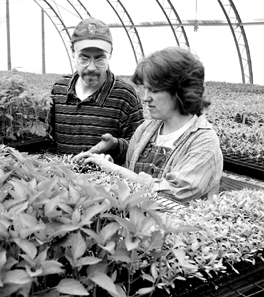
| NEWS |
| |
| FEATURES |
| ENTERTAINMENT |
| COLUMNS |
| CONTACT US |
| HOW TO SUBMIT |
| BACK ISSUES |

caption:
|
Honey Brook Organic Farm Seeks To Create a 'Viable Agriculture'
Matthew Hersh
With a vast portion of Mercer County's 228 square-miles subject to growth and development, it is more and more difficult to find visible signs that this area was once a haven for farmers and the agriculture industry.
The 830-acre Stony Brook-Millstone Watershed Reserve in Pennington is one of the most environmentally-sensitive geologic landscapes in the state. With woodland and fields along Stony and Honey Brooks, the reserve feels like it is one of the few places that has yet to be affected by encroaching development.
The Honey Brook Organic Farm takes up about 90 acres of the reserve, with 65 acres involved in actual crop production. Established in 1984, Honey Brook is one of the two oldest operating organic farms in the state. Not only does it practice the ways of the agricultural origins of the region, it recognizes that those practices have become increasingly industrialized and works to offer something different for its patrons and the community at large.
"The farming industry was really leaving out a lot of things," said farmer and manager Jim Kinsel. "Agriculture is kind of in shambles, and God knows with what the country is doing, the future looks even worse," he added.
Mr. Kinsel, who runs the farm with Sheri Dudas, targeted mainstream agricultural methods as practices that cannot be sustained for long by our current environmental constraints. The primary emphasis of the organic farm, he said, is largely on the soil, which is seen in industrial farming as simply a cradle for vegetation. Mr. Kinsel and Ms. Dudas, who have been a couple for seven years, take pride in their method of farming.
"For some organic growers, the crop is almost a side effect," Mr. Kinsel said. "A truly healthy plant is one that isn't doped up on chemical fertilizers, pesticides, and herbicides."
"In organic farming, it takes a fundamentally different approach to growing crops," he said. "You tend to work with nature instead of against it, it's almost a cliché, but it pretty much sums things up."
Mr. Kinsel and farmer Jeff Schaczenski founded the farm's Community Supported Agriculture (CSA) program in 1991. Initially launched with 50 members, Mr. Kinsel quickly doubled membership and farm acreage in 1992, after Mr. Schaczenski left to raise a family.
Being single at the time, Mr. Kinsel was able to fully devote his energy to establishing a self-sustaining agricultural community. It was a stark change of pace for him, as he had previously worked in the actuary department at Prudential in Newark.
"One day, on his train ride, he figured he wanted to do something more meaningful," said Ms. Dudas, who joined the farm as its planner in 2002. A Rutgers University alumnus, Mr. Kinsel went to study at Cook College for organic farming and began apprenticing at several area farms.
Ms. Dudas had previously worked for the state Green Acres program and helped develop their agricultural preservation plan. She subsequently ran Green Acres' Right to Farm program, which sought to solve conflicts between farmers and their neighbors or municipalities.
"I was increasingly finding myself in the office more at my old job, and I really like to do field work," she said. "So this was perfect."
With no country store for the casual buyer, Honey Brook is committed to providing affordable, high-quality produce for its members, Ms. Dudas said.
Further, working at a smaller scale than a more mainstream farm, Mr. Kinsel and his workers take steps to avoid crop disease and other problems that can diminish the yield of a harvest.
"You attempt to prevent problems rather than attacking them once they arise," Mr. Kinsel said. One of the keys to preventing problems, he added, is to rotate crops, an agricultural practice that is virtually unseen in traditional farming practices. In rotation, crops are moved around spatially through the fields from year to year. The method lessens the chances of insect and disease problems by providing insects the same plant year after year.
This practice increases the number of crops that the farm is able to grow, and is in direct concert with the goals of the CSA.
"The CSA is a kind of co-op, there's a more direct connection between the consumer and a farm," he said. "We are trying to provide for the widest range of crop needs of our membership."
The farm specializes mainly in vegetables and small fruit. Within that set of crops, which include arugula, beets, basil, bok choi, zucchini, eggplant, and tomatoes, Mr. Kinsel said that there is enough variety to keep members involved.
"I think diversity is really the key, we try to do as many different things as we can," he added. Honey Brook also provides produce to several area caterers and restaurants including Masala Grill on Chambers Street and the Brothers Moon in Hopewell.
Ms. Dudas said she is encouraged that local enterprises are committed to local farming, even though there are easier outlets through which to get produce, and the farm does not make deliveries to contributing caterers and restaurants.
"It's hard for businesses to get out of that [corporate food] loop, and we know that it's not easy," she said.
Keeping local businesses feeding into the local economy is paramount, Mr. Kinsel said.
"CSA was an effort to allow consumers to short circuit the existing market path and to get more directly involved with a local farm," he said. While it involves more commitment, and a recognition that there are natural patterns of regional agriculture, membership continues to increase, he added, and those members appreciate the importance of the farm's brand of agriculture.
"Civilization starts with the soil," he said, opening the door for Ms. Dudas to add that "culture starts with agriculture."
